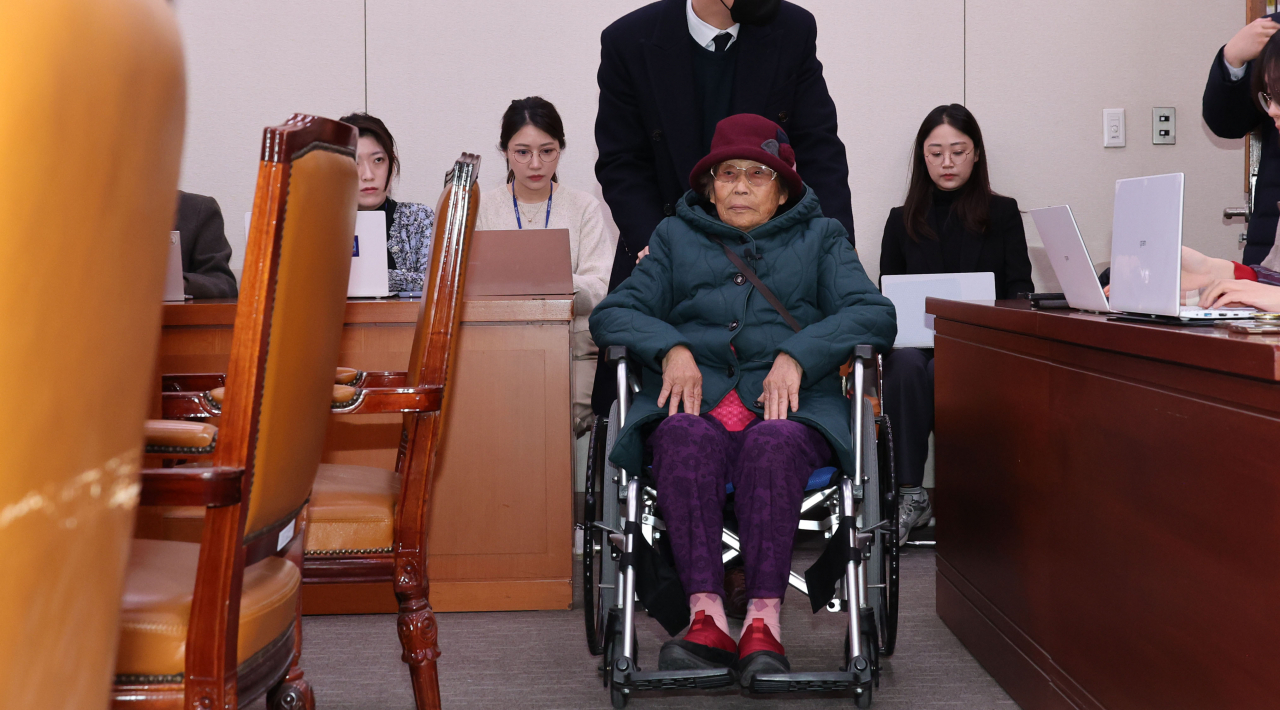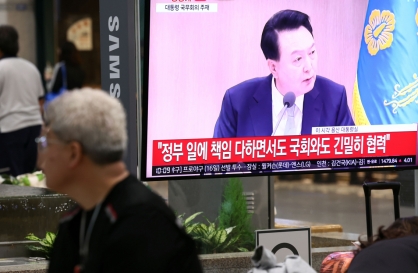I’m not taking a dime of that money: WWII forced labor victim
Ahead of summit, main opposition party goes on offensive against Yoon's compensation plan for wartime forced labor victims
By Kim ArinPublished : March 13, 2023 - 15:54

A South Korean victim who was forced to work for a Japanese company during World War II said Monday she would refuse to accept locally funded compensation as proposed by the Yoon Suk Yeol administration.
Testifying before the National Assembly foreign affairs committee, Yang Keum-duk, who was conscripted in her early teenage years to work at a plant in Japan’s Nagoya, said she would “never accept” South Korean money as compensation.
“I would rather starve to death than receive that money,” she told lawmakers.
“I was told because I was a bright student, I would be going to Japan to study at a middle school there. Instead I was worked to the bone. Now you are saying that they (Japanese employers) won’t compensate me. I can’t accept this.”
She went on, “I’m nearly ninety-five years old. No one has made things right for me. If my country can’t, then who will? I want to tell the president to step down.”
Yang spoke to a half-full plenary session of the Assembly’s foreign affairs committee, which was convened by the main opposition Democratic Party of Korea lawmakers without the consent of their ruling People Power Party peers. At Monday's session, the Democratic Party lawmakers unilaterally passed a resolution urging the government to withdraw its plan to compensate forced labor victims with local funds.
As the session wasn’t agreed upon, it was presided over by Democratic Party executive secretary Rep. Lee Jae-jung instead of Rep. Kim Tae-ho, the foreign affairs committee’s chair.
The People Power Party argued for the session to be held after Yoon’s summit with Japanese Prime Minister Fumio Kishida scheduled for later this week.
“The Democratic Party opened a session of the foreign affairs committee in the absence of the ruling party as well as the committee’s chair. This is utter disregard for Assembly practices,” the ruling party member lawmakers of the foreign affairs committee said in a statement.
Rep. Tae Yong-ho, the ruling party executive secretary of the committee, told reporters that Monday’s session “shouldn’t count.”
“We have said that a session could be convened following the president’s trip to Japan. But the Democratic Party decided to unilaterally push ahead with the session. We cannot allow sessions to proceed in this manner,” he said.
He added that the session was “arranged so abruptly” that even the typist wasn’t present.
The Democratic Party has continued to resist Yoon’s forced labor plan, calling it a “diplomatic surrender” and “humiliation.”
Democratic Party’s chairperson Rep. Lee Jae-myung told a meeting Monday that Yoon “trampled on people’s pride and dignity” with the plan, which he said was the “biggest humiliation in the history of diplomacy.”
Over the weekend, Democratic Party leaders including Chairperson Rep. Lee Jae-myung took part in rallies decrying the proposed plan. The party lawmakers adopted a resolution calling for its immediate withdrawal.
Democratic Party floor leader Rep. Park Hong-keun said the Monday’s session of the foreign affairs committee was “absolutely necessary to show the will of the majority of the people of our country.”
“The government, including Foreign Affairs Minister Park Jin, ought to listen,” he said.
He said Yoon was “kowtowing to Japan to win its heart” and that he was worried the president would “humiliate our people once again” during his trip.
Last week, Yoon administration announced a plan to pay victims of Japan’s forced wartime labor through a locally funded foundation, as opposed to the Japanese companies who mobilized Koreans -- many of them minors -- as laborers.
The last few surviving victims have protested the South Korean government plan, calling for direct reparations from the Japanese companies and an apology from the Japanese government.








![[From the Scene] Monks, Buddhists hail return of remains of Buddhas](http://res.heraldm.com/phpwas/restmb_idxmake.php?idx=644&simg=/content/image/2024/04/19/20240419050617_0.jpg&u=20240419175937)







![[From the Scene] Monks, Buddhists hail return of remains of Buddhas](http://res.heraldm.com/phpwas/restmb_idxmake.php?idx=652&simg=/content/image/2024/04/19/20240419050617_0.jpg&u=20240419175937)

![[KH Explains] Hyundai's full hybrid edge to pay off amid slow transition to pure EVs](http://res.heraldm.com/phpwas/restmb_idxmake.php?idx=652&simg=/content/image/2024/04/18/20240418050645_0.jpg&u=20240419100350)

![[Today’s K-pop] Illit drops debut single remix](http://res.heraldm.com/phpwas/restmb_idxmake.php?idx=642&simg=/content/image/2024/04/19/20240419050612_0.jpg&u=)